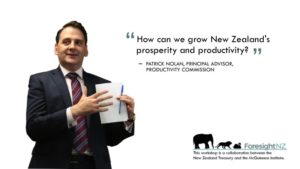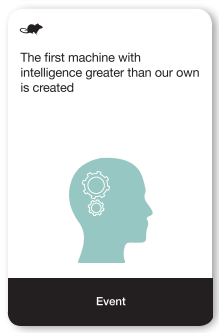 Patrick Nolan, Principal Advisor at the Productivity Commission, discusses New Zealand’s productivity and prosperity on day one of the three-day ForesightNZ workshop in Wellington on 27–29 April.
Patrick Nolan, Principal Advisor at the Productivity Commission, discusses New Zealand’s productivity and prosperity on day one of the three-day ForesightNZ workshop in Wellington on 27–29 April.
You can watch the video of his presentation on the McGuinness Institute’s YouTube channel, or view it below.
Patrick Nolan outlines three points of interest that highlight the growing importance of productivity for New Zealand’s long-term future:
- Make productivity a priority not just a technical problem (e.g. increasing productivity expands the choices available). Patrick asserts that productivity is a measure of outputs compared to inputs, and of potential to turn those outputs into outcomes. He argues that we need to ‘be smart’ and think about how we are going to lift our productivity, and uses the following Ernest Rutherford quote to emphasise this – ‘We don’t have the money so we are going to have to think.’
- Ensure policy settings recognise technological change (e.g. employment at high risk of automation). Patrick contends that technological innovation is going to have increasing impact on the labour market (e.g. truck drivers replaced by driver-less cars). However, he asserts that the destruction of some jobs is not new and is not necessarily bad because technology also creates jobs. We need to be ‘technological optimists’ when we think about the future of technology in the work-place and highlight the opportunities that technology presents.
- Ensure policy settings recognise demographic change (e.g. more of us will live beyond 65). Patrick also outlines how technology is driving change in health care, which ultimately shifts how we are thinking about policy settings. Patrick asks, ‘what are the implications of improved health care?’ He asserts that by 2042 there will be 1.29 million people over 65 years of age, which is a growth rate of 2.5% in the over 65 age group (compared to an overall population growth of 0.7%). He argues that this population distribution is important to think about in terms of the labour market; the working age is going to shrink because there will be more retirees, so workers are going to have to be more productive to pay for things like pensions.
ForesightNZ playing cards
Patrick’s presentation led to the development of the ForesightNZ Event Card: The first machine with intelligence greater than our own is created. This card is one out of a pack of 64 that was developed at the ForesightNZ workshop. Participants created a robust foresight tool in the form of a pack of cards based on the events and trends that they believe could significantly shape New Zealand’s long-term future. They then designed three different games to play with the pack. The games aim to develop a deeper understanding of the possible futures that might occur if a small number of those cards played out in real life. The pack of cards are in the final stage of production and will soon be made available to download, print and cut your own – keep an eye out on the website. They are also available to purchase from our online store. The accompanying booklet is now published on the website and available to purchase here.
About the ForesightNZ workshop
Project: ForesightNZ aims to build public policy capability in New Zealand by encouraging long-term, agile thinking around our uncertain future. Initiated in 2008, ForesightNZ is about conceptualising the broad range of possible futures for New Zealand through up-to-date tools and conceptual approaches used in the field of futures studies. The primary focus of the ForesightNZ: Untangling New Zealand’s long-term future workshop was to develop a way to deal with the increasing complexity and uncertainty in the world around us. This workshop was a collaboration between the New Zealand Treasury and the McGuinness Institute. To watch other speaker presentation videos from the ForesightNZ workshop, head to the McGuinness Institute’s YouTube Channel.
